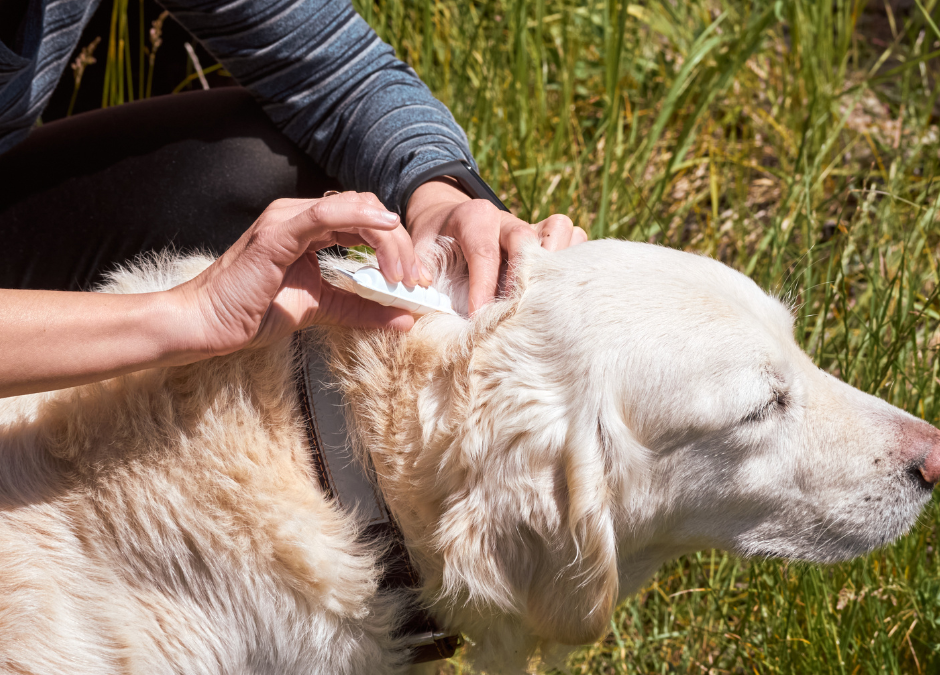Flea Treatment: Protecting Your Pets and Home from Fleas
Fleas are tiny, agile insects that can cause a great deal of discomfort for both pets and their owners. A flea infestation can quickly spiral out of control if not addressed promptly and effectively. In this comprehensive guide, we will explore various methods of flea treatment both on your pets and in your home. From veterinary treatment options to recommended products, we will cover everything you need to know to combat fleas and ensure a flea-free environment for your beloved companions. Flea control and flea treatment is an important part of hospice by ensuring your senior pet is comfortable in their senior years.
Understanding Fleas and Their Life Cycle:
Fleas are blood-sucking parasites that thrive on the blood of their hosts, typically dogs and cats. Understanding the flea life cycle is crucial to effectively treating and preventing infestations. The flea life cycle consists of four stages:
- Eggs: Adult female fleas lay hundreds of eggs on their hosts, but the eggs quickly fall off onto the pet’s bedding, carpet, and furniture.
- Larvae: The eggs hatch into tiny larvae that feed on organic debris and flea dirt (digested blood excreted by adult fleas).
- Pupae: The larvae spin cocoons and enter the pupal stage, where they develop into adult fleas.
- Adult Fleas: Fully developed adult fleas emerge from their cocoons and seek a host for a blood meal, starting the cycle anew.
To effectively treat for fleas, it is essential to address all stages of the life cycle.
Veterinary Treatment Flea Treatment Options for Pets:
- Topical Spot-On Treatments: Topical spot-on treatments are one of the most popular and effective methods to control fleas on pets. These treatments come in small tubes and are applied directly to the skin between the shoulder blades or at the base of the pet’s neck. The active ingredients in spot-on treatments spread through the skin’s oils, providing long-lasting protection. Some well-known brands include:
A. Advantage II: Contains imidacloprid and pyriproxyfen, which kill adult fleas and inhibits eggs and larvae.
B. Frontline Plus: Contains fipronil and (S)-methoprene, effective against adult fleas, flea eggs, larvae, and ticks.
C. Revolution: Combines selamectin to kill adult fleas with additional protection against heartworms, ear mites, and other parasites.
- Oral Flea Medications: Oral flea medications are another effective option for pet owners seeking long-lasting protection against fleas. These medications come in the form of chewable tablets or soft chews and are easy to administer. The active ingredients are absorbed into the bloodstream, killing fleas when they bite. Some popular brands include:
A. NexGard: Contains afoxolaner, which rapidly kills fleas upon biting and continues to protect for a full month.
B. Bravecto: Contains fluralaner and provides protection against fleas and ticks for up to 12 weeks.
C. Comfortis: Contains spinosad, which starts killing fleas within 30 minutes of administration and remains effective for a month.
- Flea Collars: Flea collars are a convenient option for pet owners who prefer continuous protection against fleas. These collars release active ingredients that repel and kill fleas. One widely used flea collar brand is
A. Seresto: Provides up to eight months of continuous protection against fleas and ticks with the active ingredients imidacloprid and flumethrin.
- Shampoos and Sprays: Flea shampoos and sprays provide immediate relief from a severe flea infestation but may not offer long-term prevention. These products are ideal for spot treatment and can be used in conjunction with other preventative methods. Some well-known brands include:
A. Adams Plus Flea & Tick Shampoo: Contains pyrethrins, piperonyl butoxide, and (S)-methoprene to kill fleas, ticks, and flea eggs.
B. Vet’s Best Flea and Tick Waterless Bath Foam: Made with natural ingredients like peppermint oil and eugenol to kill and repel fleas and ticks.
Flea Treatment for the Home:
- Vacuuming: Regular and thorough vacuuming is essential to removing flea eggs, larvae, and pupae from carpets, furniture, and crevices. Focus on areas where pets spend the most time, as fleas prefer warm and shaded locations.
- Washing Bedding and Linens: Washing your pet’s bedding, blankets, and linens in hot water can help eliminate fleas at all life stages. The high temperatures kill fleas and their eggs effectively.
- Flea Foggers and Sprays: Flea foggers, also known as “flea bombs,” and sprays are effective at targeting fleas in all life stages. These products release insecticides that cover large areas, reaching hidden spaces where fleas may be hiding. Some effective brands include:
a. Raid Flea Killer Plus Fogger: Kills fleas and hatching eggs and provides coverage for up to four months.
b. Zodiac Flea & Tick Spray: Suitable for use on furniture, carpets, and pet bedding to kill fleas, ticks, and other pests.
- Insect Growth Regulators (IGRs): IGRs are substances that disrupt the flea life cycle by preventing eggs and larvae from maturing into adults. Incorporating IGR products into your home treatment plan can provide longer-lasting results. Some effective IGR brands include:
A. Precor: Contains methoprene, which inhibits the development of flea eggs and larvae.
B. Nylar: An effective ingredient that prevents fleas from reaching the adult stage.
Flea infestations can be challenging to manage, but with the right approach and a combination of veterinary treatments and comprehensive home treatments, you can successfully eradicate fleas from your pets and living spaces. Remember that prevention is key to avoiding future infestations, so maintaining regular flea prevention measures is essential. Always consult your veterinarian before using any products on your pets, as individual sensitivities and health conditions must be taken into account. By taking proactive steps and using recommended products, you can ensure a happy and flea-free environment for both you and your beloved furry companions.
*** All information in this article is for education only. It is recommended to work directly with your veterinarian to come up with a safe and comprehensive plan to treat your pet and home for fleas.


Recent Comments